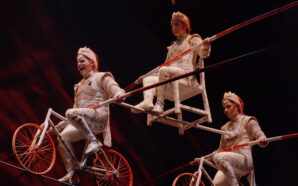Behind the Scenes of the East L.A. – Set TV Show with Melissa Barrera
Arturo Hilario
El Observador
Melissa Barrera is a Mexican actress whose current project, “Vida”, is playing on the Starz network. The show sets up a family dilemma for two estranged sisters, Emma and Lyn, who must head back home to East Los Angeles after the death of their mother and settle her unfinished affairs.
In the show, Barrera stars as Lyn, who can be described as a millennial party girl trope at first glance. But as Barrera will point out, the looks are deceiving.
“Vida” showrunner Tanya Saracho, a playwright whose past projects have been Latinx-centric, follows up those projects with a writers’ room of mostly Latinx and queer women who have attempted to provide an honest and well-rounded account of the diverse life around Latinx L.A. with this show.
In the following interview Barrera gives us insight into the world of “Vida”, learning East L.A. slang, and how she connects to the show’s characters through the intimate writing and cultural ties.
Thanks for taking time to answer our questions Melissa. To start off, what is it that attracted you personally to “Vida”?
I think it was a no brainer for me and probably every other Latinx actor in L.A. and in the United States because it’s a show that doesn’t really come around often, one where the Latinx community has an opportunity to be at the forefront of a TV show and to be able to tell our stories. I personally already knew about Tanya’s work, I was familiar with the play “Fade”, and I knew that she had a very authentic voice.
When I found out that she was creating the show I was like, “I want to be a part of it. I don’t care what it is.” Then I read the breakdown of Lyn, and I completely saw myself in the character. I thought, “This is perfect for me. I can do this.” And I was lucky enough to get called back to meet Tanya and [Casting Director] Carmen Cuba, do a series of very nerve wracking callbacks, and eventually get offered the part.
From your perspective, what is the story of “Vida” about?
The story is about two second generation Mexican-American sisters that grew up in East L.A. and left because they both thought that they were too much, they were too big for their small neighborhood and they wanted to grow, they wanted to have a better life, as many of us do when we move out of our hometowns. I know I did as well.
They have to come back to East L.A. when their mother dies, to bury her and to deal with her unfinished business, the inheritance and all that. And they think they’re gonna be able to do that quickly and get back to their lives, and then they discover that their mother was married to a woman, and that they now have to share the inheritance with her and have to deal with all of the mess that she left behind.
Your character, Lyn, arrives from the Bay Area at the beginning of the show. Could you tell me a bit about Lyn, and her motivations when we are first introduced to her?
Lyn is a very interesting character because at the beginning we see her, and you see the millennial girl, you see the trendy, hipster girl that that goes by in the world pretending to be very worry free, very social and “party-party”, and that’s all that she cares about. In reality, she is very lost. She doesn’t know who she is, and she’s been running away from her roots, a Mexican heritage, and just kind of using her “mexicaness” to her advantage; her exoticness, to seduce men, to seduce friends, with her exotic look and features.
But, in reality she doesn’t know who she is because she’s been giving value to herself by what others see in her, she hasn’t really found her purpose in life. And although she pretends that she’s very happy and she just goes with the flow, that nothing really phases her, she is hiding a lot of discomfort and pain and unhappiness in her life, and the way she has been living it.
She is constantly seeking love in whatever unconventional way people may take. She’s just trying to find answers all around. She’s trying to see where she fits in, in her family dynamic, in the community, in the world. Which is true to a lot of children of immigrants I think, to a lot of people with dual heritage that are stuck in a limbo between not being American enough, and not being Mexican enough, or Puerto Rican enough, or Asian enough, whatever their dual heritage is I think it’s true to a lot of people. That will resonate with a lot of people that watch this show.
In terms of when you were fleshing out how you would portray the character, how much input did you have in figuring out what Lyn would sound like, what she would say, and how she would react to situations?
Well, Tanya is really sneaky about a lot of things because when I got cast the show wasn’t written. The pilot was written, it changed a lot to what ended up being in the first episode, but we had sessions with the writers where we would go in and tell them a little about us, about our stories, about who we are. I think it was just so they could get a feel for us and they could make the character very close to our hearts.
It ended up being that. I would go in and read an episode and be like, “Wait a minute, I said this to the writers.” And it just made it so much easier to connect because they made them have similar insecurities and some of the same vocabulary and reactions to things, and history even. So that made it easier to connect, but also scarier to act because when we had to go into certain themes you would feel very vulnerable. You don’t feel like you’re acting at all, you feel like it’s just yourself putting everything out there, bearing your soul and your heart, and everything. So, I think that is why you can see a lot of truth in the show. There’s a lot of all of us in there and I think that’s what makes our writers so good and so special, they got to know us first and then they wrote the show. The voices are so real.
Speaking on the writers, most of the writers’ room is made up of women yes?
We have one writer who is a man, and the rest are women. And they’re all Latinx. I think half of the room is queer. So, it’s a very cool, talented writers’ room that Tanya put together.
With that in mind, the themes in the show and the characters that are coming from LGBTQ experiences, it seems like there is definitely a production side that is fostering inclusiveness.
Yeah, Tanya is really big on “inclusive”, and being inclusive in all aspects. From the crew, to the writers’ room, to the department heads to the cast. We have a nonbinary actor, Ser Anzoategui. We had trans actors come in and be guest stars. We even had something amazing! In episode four a man that Lyn meets, Jackson, he is playing white, but he is actually Cuban.
So, it was like the opposite of whitewashing, like brownwashing or whatever. Which is amazing because Latinos have had to deal with whitewashing a lot in the industry where they cast white actors to play people of color and now Tanya got the chance to do that but the other way around, which I think just shows how much of a badass Tanya is.
Being a Latina on the show, what would you say are some examples of moments or themes in “Vida” that you related to on a personal level?
Well everything. “Señoras” [Editor’s Note: These are people who can foretell the future and reveal influences in the past through methods like card reading] like the “limpias”. I grew up around that, it was very familiar to me. My mom to this day cleans my whole body with an egg every time she’s with me because that protects me against “evil eye”. The language too, the Spanglish. I grew up near the border in Mexico and I grew up going to an American school.
I would speak English at school then speak Spanish [elsewhere] and that kind of makes the wires cross. So sometimes you don’t know how to say a word in Spanish and you say it in English and vice versa. And that is where the “pocha” thing was very familiar to me. Also, the eastside of LA, it’s such a magical place. It has so much culture and the people are so warm, and it reminds me of Mexico a lot. I took trips to research the east side and get familiar with the area because I was new to LA, so I didn’t really know the city and much less the specific neighborhood. I went, and I felt like I was back in Mexico City where I had been living for the past 5 years, and I understood why it was so important to show this side of east LA. You don’t really get to see it on TV, we get to see the gangster side, the dangerous side, but it’s honestly such a wonderful place. I’m so happy that I get to be on a show where it’s represented honestly, the way that it actually is.
I was looking at the list of “Vida” terminology and slang words used in the show, and was wondering if you had a favorite term or one you might have not known before the show that was interesting to you?
I had never heard of the term, “rascuache”*. I was like, “What does that mean?” Tanya explained it to me, the word itself sounds like what it means. It was a word that I didn’t know. I feel like slang changes from region to region. I’m currently in New Mexico, which has a very big Hispanic population. It’s the only state in the United States that has a majority Hispanic population and the slang here is different. So, I had to learn a little bit of the east side slang for the show.
The cool thing about it too is that if you’re a Latino from wherever you are you are going to be able to connect with the show. And if you are not. If you are from some other heritage, then you’re still going to be able to connect and I think that the Spanglish is dealt with in a way where even if you don’t speak the language you can still understand what they’re saying in context. I think that is why Tanya didn’t want subtitles, she was like, “I don’t want this to be a subtitled show because we don’t need the subtitles, I think people will be able to get what we’re saying.” And of course, if you understand Spanish, then you’re in, you’re on the inside joke. I think it’s a generalization for everyone, it’s an American show.
What has been your most memorable experience or aspect in being part of “Vida”?
Well I think I have a lot of moments, but one recent one that I had was at a screening in Boyle Heights at a theater with a lot of community of Boyle Heights, which was nerve wracking for us because we shot a little bit in Boyle Heights and basically [were] representing them, who have lived in this area for so long, and we didn’t know what to expect. If they were going to react well or they were going to be mad.
We screened two episodes and then we had a food mingling thing after to talk to the patrons of the theater and I was eating flautas and enchiladas and all the good food that they had there, and a woman comes up to me and taps me on the shoulder and she’s like, “Um, you’re Mexican right?” And I’m like, “yeah”.
She’s like, “You’re making us proud.” And that’s it and she left. Seriously I choked up, I was trying not to cry in front of all these people because hearing that was honestly why I do what I do. That’s all I want and that’s all I ever wanted playing Lyn. That was the best gift that anybody could have ever given me, saying that.
Because also, I’m Mexican, and I’m playing a Mexican-American, which is a whole other world. We have a lot of things that connect us but growing up Mexican and growing up Mexican-American is a totally different experience. So, I also felt that pressure of representing them well and I wanted to do it with as much truth as possible and with all my love you know, because I respect the community so much and I know that I’m not part of it completely.
I just hope that the Latinx community in the United States can connect and they can see themselves reflected in Lyn, and hopefully all the other characters.
See Melissa Barrera on “Vida”, now playing weekly on Starz for six episodes.
*Rasquache – How Californian Mexican-Americans colloquially grade or value an object or person of low or no quality. It’s a little mean and classist, but it’s commonly used to describe something “ratchet” or “ghetto.”






